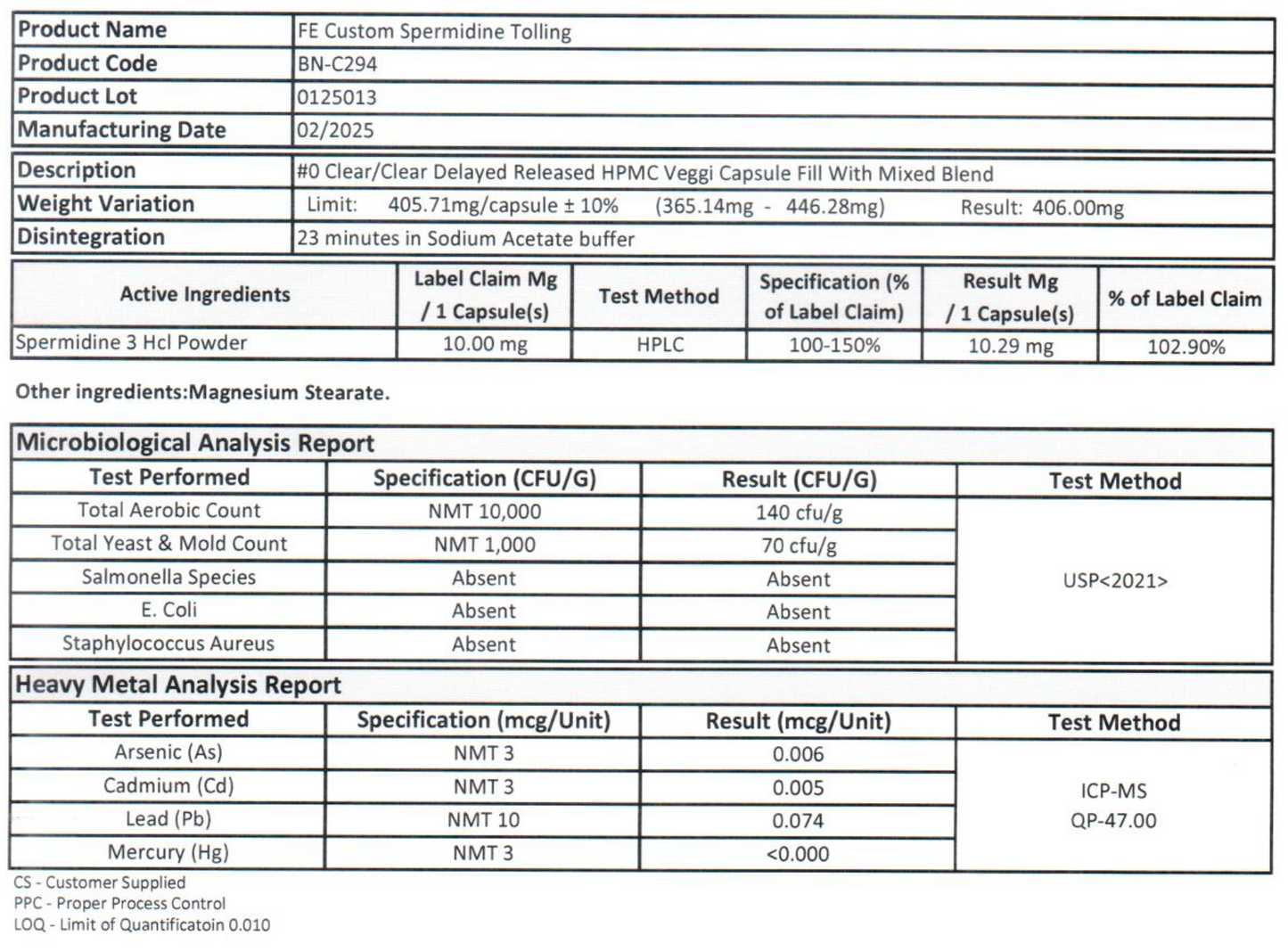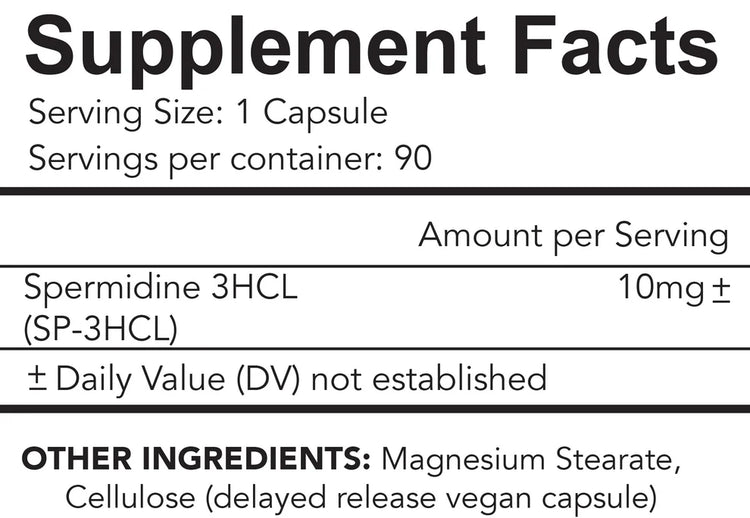




Spermidine (SP) is a biogenic molecule found naturally in both male and female tissues, having a crucial role in various cellular processes. SP is notably involved in cellular homeostasis, lifecycle, and the induction of autophagy—an intracellular system of degradation and recycling, vital for cell survival and maintenance. This complex process plays an important role in healthy aging and prolonging lifespan.
What is autophagy?
Senescent cells are those which no longer multiply, but don’t die either. These cells can then affect healthy cells nearby, like a rotten apple in a bowl of good apples. Autophagy prevents senescence by quality controlling cellular constituents to prolong the survival of the cell. However, SP concentrations become suppressed with age, which enhances the formation of damaged parts of the cell, while hindering the cell’s ability to degrade these components. The result of dysregulated cellular lifecycle is cellular damage, which can lead to numerous age related health issues. SP and the induction of autophagy is vital to intracellular health and longevity.
SP-3HCL is the result of expert aging science. Our liposomal synthesis is professionally formulated, combined with delayed release vegan capsules which are clinically proven to resist stomach acids for targeted absorption in the small intestine and maximum bioavailability.
SP-3HCL is proudly manufactured in the USA and sold exclusively in the USA. Every batch is third-party tested for purity and fully GMP Certified. Our packaging includes BPA free ultraviolet glass for superior preservation, as well as FSC mix box material and soy-based inks to help protect forests and promote sustainable practices in the packaging industry.
The science of healthy aging is clear: Cell health = Your health.

Take one (1) capsule daily, without food in the morning, or as directed by your healthcare professional. Consult your healthcare professional before taking any dietary supplement, if you are pregnant, nursing, or taking any medication. Keep out of reach of children.
Store in a cool, dry place away from direct sunlight. Do not use if tamper-evident packaging is broken or missing.
Spermidine: A Multifaceted Polyamine with Potential Health Benefits in Aging, Cognition, and Cardiovascular Function*
Spermidine is a naturally occurring polyamine that has gained significant attention in recent years due to its potential health benefits, particularly in the context of aging and cognitive function. This review summarizes the current understanding of the biological role of spermidine, its effects on various physiological processes, and potential therapeutic applications.
Biological Roles and Mechanisms of Action
Spermidine plays a crucial role in various cellular processes including cell growth, differentiation, and protection against oxidative stress. It serves as a starting material for creating a unique chemical modification, called hypusine. This modification is essential for the proper functioning of a protein known as eukaryotic translation initiation factor 5A (eIF5A). eIF5A is a key player in the complex machinery that cells use to translate genetic information into proteins. (1) Spermidine is also involved in the regulation of autophagy, a cellular degradation process that removes damaged organelles (cell organs) and proteins, which is critical for maintaining cellular balance and promoting longevity. (2) Autophagy is crucial for protecting against neurodegenerative and cognitive dysfunction associated with aging. (3)
Effects on Aging and Longevity
Spermidine has been shown to induce autophagy in various model organisms, including yeast, nematodes, fruit flies, and human cells. (4) Spermidine supplementation has been shown to extend the lifespan of various model organisms, including yeast, nematodes, and fruit flies. (4) These studies have shown that spermidine treatment can significantly extend the lifespan of various organisms. In yeast, a four-fold increase in lifespan was observed compared to untreated cells, with aging cells exhibiting decreased spermidine levels. Nematodes experience a 15% increase in lifespan, which is dependent on autophagy. Similarly, fruit flies showed a lifespan extension of up to 30%, which is also reliant on autophagy. In human cell cultures, spermidine supplementation resulted in 35% more cells than that in the control group. These effects are believed to be facilitated by stimulation of autophagy and improved mitochondrial function. The observation of these results across different animal species highlights the significance and evolutionary role of spermidine. (4)
In humans, a higher nutritional intake of spermidine has been associated with reduced mortality and improved cognitive function in older adults.* A prospective population-based study found that a higher spermidine intake was associated with lower mortality rates.* (5) Additionally, spermidine levels in humans aged between 60 and 80 years were found to be lower than in those below 50 years, but interestingly, humans older than 90 years had levels similar to those below 50 years, suggesting that maintaining spermidine levels in aging may contribute to longevity. (6)
Cognitive Function and Neuroprotection
Spermidine has shown promising effects on cognitive function and neuroprotection. In animal studies, spermidine supplementation improved spatial learning and memory in aged mice. (7) The mechanism underlying these cognitive benefits appeared to be related to enhanced mitochondrial function in the hippocampus and increased hypusination of eIF5A.
Human studies have also provided evidence of the cognitive benefits of spermidine. A randomized controlled trial of older adults with subjective cognitive decline found that spermidine supplementation moderately improved mnemonic discrimination performance. (8) Alzheimer's patients often struggle to tell apart memories that are very similar. The ability to distinguish between closely related memories is called mnemonic discrimination. Spermidine may help improve this skill in patients with AD.* By taking spermidine supplements, these individuals may become better at separating and recalling specific details from their memory.* This could help them avoid mixing similar events or experiences, thus making their memory recall more accurate and reliable. However, a subsequent long-term study did not find significant modifications in memory and biomarkers in older adults at risk for Alzheimer's disease, suggesting that more research is needed to fully understand the effects of spermidine on cognitive function in humans. (9)
Cardiovascular Health
Spermidine has demonstrated potential benefits in cardiovascular health. Studies have shown that spermidine can inhibit vascular calcification, particularly in the context of chronic kidney disease, by upregulating Sirtuin 1 (SIRT1) and inhibiting endoplasmic reticulum (ER) stress.* (10) As the ER is stressed, proteins can misfold and increase the formation of reactive oxygen species, causing damage to the cell. (11, 12) Additionally, spermidine supplementation has been associated with improved arterial stiffness and endothelial function, suggesting its potential as an antiaging agent for vascular health.* (13) During aging, the arteries lose their elasticity, leading to hypertension, higher blood pressure, and other cardiovascular problems. (14, 15) Spermidine supplementation has been linked to reduced arterial blood pressure and protection against hypertension-induced damage in animal models of hypertension.* (16, 17) These cardioprotective effects are thought to be mediated by enhanced cardiac and mitophagy.
Cancer and Immune Function*
The role of spermidine in cancer biology is complex and context dependent. Some studies have shown that spermidine can enhance anti-cancer immune responses and improve the efficacy of immunotherapies, particularly in aged mice.* (18, 19)
Spermidine has been found to modulate immune function, particularly in macrophages. It promotes the polarization of macrophages towards an anti-inflammatory M2 phenotype, which may have implications for various inflammatory and autoimmune conditions.* (20, 21)
Safety and Tolerability
Clinical studies have generally found that spermidine supplementation is safe and well-tolerated. A randomized placebo-controlled trial in older adults with subjective cognitive decline reported no significant adverse effects or changes in vital signs, clinical chemistry, or hematological parameters with spermidine supplementation. (22)
Conclusion
A growing body of research on spermidine suggests its potential as a promising compound for promoting healthy aging, cognitive function, and cardiovascular health. Its ability to induce autophagy and enhance mitochondrial function appears central to its beneficial effects. However, while animal studies and human trials have shown promising results, more extensive and long-term human studies are needed to fully elucidate the effects of spermidine supplementation. Future research should focus on determining the optimal dosing, long-term safety, and specific populations that may benefit most from spermidine interventions.
*This literature review has not been evaluated by the Food and Drug Administration, and therefore the information contained herein is not intended to diagnose, treat, cure, or prevent any disease. According to the FDA, only drugs can make those claims.
References
1. Pegg, A. E. Functions of Polyamines in Mammals. Journal of Biological Chemistry 291, 14904–14912 (2016).
2. Madeo, F., Eisenberg, T., Pietrocola, F. & Kroemer, G. Spermidine in health and disease. Science 359, (2018).
3. Ghosh, I., Sankhe, R., Mudgal, J., Arora, D. & Nampoothiri, M. Spermidine, an autophagy inducer, as a therapeutic strategy in neurological disorders. Neuropeptides 83, 102083 (2020).
4. Eisenberg, T. et al. Induction of autophagy by spermidine promotes longevity. Nature Cell Biology 11, 1305–1314 (2009).
5. Kiechl, S. et al. Higher spermidine intake is linked to lower mortality: a prospective population-based study. The American Journal of Clinical Nutrition 108, 371–380 (2018).
6. Pucciarelli, S. et al. Spermidine and Spermine Are Enriched in Whole Blood of Nona/Centenarians. Rejuvenation Research 15, 590–595 (2012).
7. Schroeder, S. et al. Dietary spermidine improves cognitive function. Cell Reports 35, 108985 (2021).
8. Wirth, M. et al. The effect of spermidine on memory performance in older adults at risk for dementia: A randomized controlled trial. Cortex 109, 181–188 (2018).
9. Schwarz, C. et al. Effects of Spermidine Supplementation on Cognition and Biomarkers in Older Adults With Subjective Cognitive Decline. JAMA Network Open 5, e2213875 (2022).
10. Liu, X. et al. Spermidine inhibits vascular calcification in chronic kidney disease through modulation of SIRT1 signaling pathway. Aging cell 20, (2021).
11. Ong, G. & Logue, S. E. Unfolding the Interactions between Endoplasmic Reticulum Stress and Oxidative Stress. Antioxidants 12, 981 (2023).
12. Fujii, J., Seo, H. G., Homma, T. & Kobayashi, S. Mutual interaction between oxidative stress and endoplasmic reticulum stress in the pathogenesis of diseases specifically focusing on non-alcoholic fatty liver disease. World Journal of Biological Chemistry 9, 1–15 (2018).
13. Larocca, T. J., Gioscia-Ryan, R. A., Hearon, C. M. & Seals, D. R. The autophagy enhancer spermidine reverses arterial aging. Mechanisms of Ageing and Development 134, 314–320 (2013).
14. Van Bortel, L. & Spek, J. Influence of aging on arterial compliance. Journal of human hypertension 12, 583–586 (1998).
15. Blacher, J. & Safar, M. E. Large-artery stiffness, hypertension and cardiovascular risk in older patients. Nature Clinical Practice Cardiovascular Medicine 2, 450–455 (2005).
16. Eisenberg, T. et al. Dietary spermidine for lowering high blood pressure. Autophagy 13, 767–769 (2017).
17. Eisenberg, T. et al. Cardioprotection and lifespan extension by the natural polyamine spermidine. Nature Medicine 22, 1428–1438 (2016).
18. Zimmermann, A., Madeo, F. & Hofer, S. J. Molecular targets of spermidine: implications for cancer suppression. Cell Stress 7, 50–58 (2023).
19. Al-Habsi, M. et al. Spermidine activates mitochondrial trifunctional protein and improves antitumor immunity in mice. Science 378, (2022).
20. Li, Q. et al. Spermidine Associated with Gut Microbiota Protects Against MRSA Bloodstream Infection by Promoting Macrophage M2 Polarization. ACS infectious diseases 10, 3751–3764 (2024).
21. Niechcial, A. et al. Spermidine Ameliorates Colitis via Induction of Anti-Inflammatory Macrophages and Prevention of Intestinal Dysbiosis. Journal of Crohn’s and Colitis 17, 1489–1503 (2023).
22. Schwarz, C. et al. P57. Safety and tolerability of spermidine supplementation: A translational study in mice and older adults with subjective cognitive decline. Clinical Neurophysiology 129, e91 (2018)




